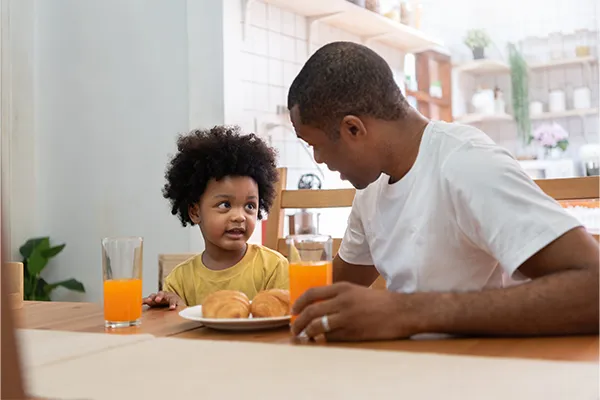5 Ways to Support and Prioritize Your Child During Divorce
Helpful tips for supporting your child’s emotions and mental health during divorce.
- 4 min read
- guest author
- child development
- divorce

Divorce is one of the most challenging experiences a family can go through. While it brings emotional turmoil for both parents, children are often “caught in the middle” and bear the brunt of the associated change in ways that may not be immediately obvious.
Co-parents hold an immensely important role in supporting and prioritizing their children throughout their divorce. As a co-parent, you can provide your child with reassurance, empathy, and love amid the emotional turmoil and logistical change.
Navigating the divorce journey with your child’s well-being at the forefront is crucial. Let’s break down five essential ways to best support and prioritize your child through your divorce.
1. Understand your child’s perspective
One of the most important things you can do for your child is understand your divorce through their eyes. Children, depending on their age and development, will process divorce differently. For example, a toddler may not fully grasp what is happening but will sense changes in their routine and their parents’ emotional state. In contrast, a teenager may experience deep feelings of loss, anger, or guilt, even blaming themselves for the separation.
Understanding your child’s perspective means truly listening, empathizing, and being mindful of their emotional experience—especially in high conflict situations. For example, you might see transition days as a chance to bring up a difficult topic with your co-parent during pick-up or drop-off.
From your child’s perspective, custody exchanges can already feel overwhelming and anxiety-inducing. By empathizing with your child’s perspective, you can choose a more appropriate time and method to communicate with your co-parent, ensuring that transitions remain as smooth and stress-free as possible for your child.
Another way to understand your child’s perspective is to observe their behavior and emotional cues, even when they aren’t verbally expressing their feelings. Children may not always have the words to articulate their emotions.
Still, changes in mood, sleep patterns, school performance, or social interactions can be signs of stress or anxiety. By paying attention to these signals, you can show your child that their feelings matter, even when they don’t know how to express them.
Children need to feel secure, and part of that security comes from knowing that their concerns are heard and respected. The more you can understand your child’s perspective, the better equipped you’ll be to support them through your divorce.

2. Focus on what’s in your control
Throughout your divorce, it’s easy to get consumed by what your co-parent is doing or saying. You may disagree with their parenting choices, communication style, or decisions. While these concerns are valid, focusing on what you cannot control will only drain your energy and create more stress for you.
Instead, shift your focus to what you can control: your actions, your responses, and the environment you create for your child. You can control how you communicate with your child, handle your emotions around them, and support them through the changes.
A major tip is to avoid bad-mouthing your co-parent in front of your child. This is something that you can control. No matter what your personal feelings may be, your child still sees their other parent as a crucial part of their life.
When children feel caught in the middle of parental conflict, it can lead to anxiety, guilt, and emotional distress. Keep the focus on your child and keep the adult talk between the adults.
3. Validate your child’s emotions
Divorce brings a flood of emotions for children, like fear, sadness, anger, confusion, guilt, and feelings of responsibility. As a co-parent, your role is not to “fix” these emotions but to validate them.
For example, instead of saying, “Don’t be sad, everything will be fine,” try, “I can see that you’re sad about this, and that’s completely okay. I’m here for you.” This simple change in language can help children feel understood rather than dismissed.
Co-parents can support their children’s mental health and encourage them to express their emotions in healthy ways, whether through talking, drawing, journaling, or physical activities. Let your child know it’s okay to feel different emotions at different times.
If your child is struggling with intense emotions, consider seeking child therapy or other professional help as a supportive resource. Having a neutral person to talk to can be incredibly beneficial for children processing their new reality and beyond.

4. Let your child be a child
Divorce often forces children to grow up faster than they should. Children may experience enmeshment and feel pressured to take on emotional responsibilities, such as worrying about their parents’ well-being. Some children experience parentification and become caregivers for their struggling parents, while others suppress their own feelings to avoid adding to the family’s stress.
It is crucial to reassure your child that it is not their responsibility to fix the situation or to take care of you. Be explicit with your child that they are still allowed to be a kid—to play, have fun, and focus on their own happiness.
Another way to ensure that your child can enjoy their childhood is by maintaining their normal routines as much as possible. If your child has sports, hobbies, or playdates, encourage them to continue those activities. Routines provide a sense of normalcy and consistency, which can be incredibly comforting for children throughout your divorce.
5. Practice self-care
One of the most overlooked yet essential aspects of helping your child through a divorce is taking care of yourself. You cannot pour from an empty cup. Your child is watching how you prioritize your own well-being and will learn from your actions.
Self-care is not selfish; it is a necessary part of protecting your mental health. Seek support from friends, family, or a professional. Prioritize activities that help you de-stress and regain balance, whether it’s exercise, meditation, journaling, or simply taking time for yourself.
It is okay to be honest with your child about your emotions, but it must be in an age-appropriate manner. For example, saying, “I’m feeling sad right now, but I know things will get better,” models healthy emotional expression without burdening your child with adult problems.
You’ve got this, and you’re not alone
Divorce is a major life change, but it doesn’t have to define your child’s future in a negative way. By understanding your child’s perspective, focusing on what you can control, validating your child’s emotions, allowing your child to be a child, and supporting yourself, you can create a foundation of security and love that will help your child navigate your divorce with resilience. In prioritizing your child’s well-being throughout your divorce, you are reminding them that they are seen, heard, and not alone.